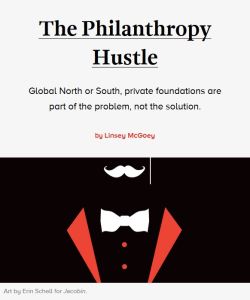Join getAbstract to access the summary!

Join getAbstract to access the summary!
Linsey McGoey
The Philanthropy Hustle
Jacobin, 2015
What's inside?
At unprecedented rates, philanthropic organizations, such as the Gates Foundation, are donating money to for-profit corporations.
Recommendation
In this succinct, compelling discussion of the current state of philanthropy, sociologist Linsey McGoey highlights a little-known fact: At unprecedented rates, philanthropic organizations are donating money to for-profit corporations. With the majority of charitable funds going to nonprofits, McGoey asks if it matters. She believes so, because the actions of philanthropic giants, such as the Gates Foundation, set a precedent. getAbstract recommends McGoey’s insights to those working in both the private sector and the nonprofit and voluntary sector.
Summary
About the Author
Linsey McGoey is a senior lecturer in the department of sociology at the University of Essex. She was an adviser to the World Health Organization and the European Neuroscience and Society Network.


















Comment on this summary